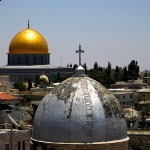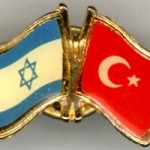
There seems to be a lot of fuss right now about whether Turkey is "turning its face towards the East".
The query, often simplistic, arises from a number of development. Turkish Foreign Minister Ahmet Davutoglu is pursuing a "Zero Problem with Neighbours" policy based on dialogue, various economic agreements, and the lifting of visa requirement. The policy includes a close relationship with both Syria and Iran.
This policy has been part of the uranium swap deal with Iran, dismissed by the West; the friction with Israel, from the "low chair" crisis up tothe nine deaths on board the
Mavi Marmara in the Freedom Flotilla; warming relations with Russia, crowned with a nuclear settlement; and the veto of sanctions against Iran in the UN Security Council.
Israeli officials reiterated, following the most recent crisis in high waters, that they view the region separated into two opposite camps. There are "moderates" such as Saudi Arabia, Egypt, Palestine (West Bank), Jordan, and Israel, There are "extremists" such as Iran, Lebanon, Syria, and (Palestine) Gaza. Israel asks: which will Turkey choose?
That blunt enquiry has been accompanied by some incredibly naive arguments, lacking an apparent notion of the basic principles of international relations.
Nuh Yilmaz wrote in Foreign Policy magazine:
"All options are on the table” is the best phrase to describe how Turkey feels about Israel’s attack on humanitarian aid flotilla carrying more than 600 activists from 32 countries... Israel will, most likely, no longer be seen as a friendly state nor an ally, but will be treated as a rogue state by Turkey.
When I say Turkey will imply that “all options are on the table,” I do not mean that Turkey will wage a war against Israel. However, more dangerously, Israel will be seen as a state against which one should protect itself and should consider any possible action because of its unlawful and rogue character.
Others placed Ankara's "adventurism" at the centre of Turkish-American relations. Steven A. Cook of
Foreign Policy argued that Turkey had not only shifted its axis but had dared to
a challenge the US:
It is hard to admit, but after six decades of strategic cooperation, Turkey and the United States are becoming strategic competitors -- especially in the Middle East. This is the logical result of profound shifts in Turkish foreign and domestic politics and changes in the international system.
Some tried to find a formula for Turkey's "shift". On Thursday, Turkish daily
Hurriyet asked whether there would be a
"Middle East Union" under Turkey's leadership in the future. This would build on a joint declaration signed among Turkey, Lebanon, Jordan and Syria, seeking to lift visas and increase the level of cooperation in the fields of energy, health, agriculture, trade and customs.
Let me be blunt with you and with those who are wringing their hands. There has been no change in Turkey's axis.
Ankara's ultimate destination is still full membership in the European Union. Turkey's efforts and regional diplomatic initiatives are a part of its economic development and a part of its struggle to turn into a "strategic" mid-power which can help (re)shape the region.
The tension between a mid-power in Ankara and an American strategic partner --- a Middle East "spearhead" --- in Israel is the outcome of a power struggle between two allies at a time when the latter is under pressures and the benefits of "direct friendly support" of Washington are being seriously being questioned, inside and outside the US. The perception arises that Turkey is trying to fill the space Israel has left/will be forced to leave.
In the context of Turkey's economic boom and diplomatic manoeuvres to increase its credibility in the region, the complicating factor is that its part to the European Union is currently blocked. Out of 34 chapters to be confirmed to accept Turkey as a part of the Union, only 12 chapters have been addressed so far. Of the other 22, 17 are being blocked by other countries --- eight alone by Cyprus.
The lesson to take from this dead end is crystal-clear: without political concessions on Cyprus and the Aegean Sea, there will be no European Union in the future for Turkey. So Ankara is not only trying to gain time by looking to its back garden but also trying to knock on Europe's door with an increased credibility.
At the end of the day, Ankara's manoeuvres are not a new invention but the reflection of an active political agenda. As the president of the Washington-based American-Turkish Council, retired Ambassador James Holmes, said,
"Turkey is expanding its interests, rather than isolating itself." The current international alignments are suitable to Turkey's interests, since Washington needs Ankara more than other countries. That is not because of the political swamp in Afghanistan and Pakistan but also because of the ongoing diplomatic track with Iran and Syria, in the aftermath of Bush the Junior's imperial policies and Israel's perceived aggression in the region. Indeed, engagement and diplomacy is preferable to Washington rather than confrontations that could dynamite Obama's "change", slapping aside unclenched fists and preventing a settlement between Israel and Ramallah.
There are limits to this political agenda. Although Ankara is ready with an economic surplus to deliver to its neighbours, it has not solved its own problems.
The weakest chain of the "Zero Problem" policy rattled in Turkey's relations with Armenia. Ankara couldn't break through long-standing fearsin the face of threats over energy supplies from the "little brother" Azerbaijan.
And, within Turkey, thousands of Kurdish children are in prisons and more officials of the Peace and Democracy Party (BDP) are arrested. Indeed, the war with the Kurdish separatist group PKK is accelerating day-by-day since the Erdogan Government see the Kurdish political movement as a "rival".
And, of course, there are always the Armenian "genocide" issue and the Cyprus problem...
Another limit is Israel . West Jerusalem still means more than a regional power to Washington, remaining and a "friend" and a nuclear "democratic" power. Indeed, Washington sorted out the most recent Flotilla problem and gave a green light to Tel Aviv for an internal inquiry into the violence on the
Mavi Marmara. Israel is not discredited in the eyes of Washington just because of a few days, not when military/intelligence relations are indispensable for both sides.
Still, if Ankara can show progress in its Kurdish and Cyprus issues in the near future along with continuing diplomacy advances in the region and a move back from blunter discourse towards Israel, it can continue increasing both its credibility to use as leverage against the EU and to promote its strategic importance to Washington.
 Saturday, June 26, 2010 at 7:11
Saturday, June 26, 2010 at 7:11  Following this week's "redevelopment" plan --- the demolition of 22 houses in East Jerusalem's Silwan neighborhood --- Israel's Public Security Minister Yitzhak Ahronovitch told the Knesset on Wednesday that Israeli police expects "widespread disturbances" in and around the area.
Following this week's "redevelopment" plan --- the demolition of 22 houses in East Jerusalem's Silwan neighborhood --- Israel's Public Security Minister Yitzhak Ahronovitch told the Knesset on Wednesday that Israeli police expects "widespread disturbances" in and around the area.



